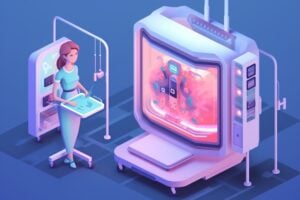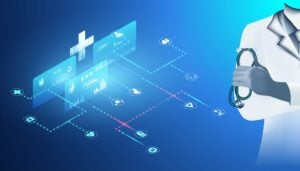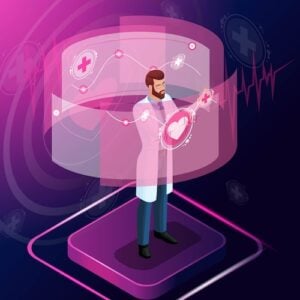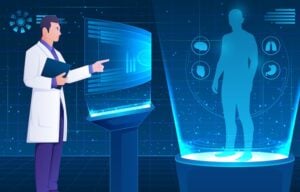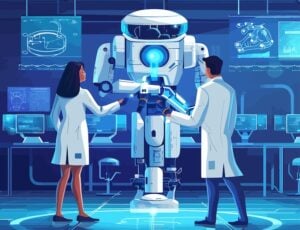As a healthcare technology leader, you’re no stranger to the buzz surrounding generative AI in healthcare. It seems like every day someone is revolutionizing something with genAI in medicine, doesn’t it? From Google’s MedLM transforming chest X-ray analysis to AI-driven breakthroughs in drug discovery at Eli Lilly, the headlines are impossible to ignore. Then there’s NVIDIA, launching dozens of gen AI-optimized microservices tailored for healthcare enterprises, and this goes on and on.
You might be wondering: Isn’t it time to harness this power in your own organization? As you grapple with budget constraints, regulatory hurdles, and integration challenges, generative AI offers tantalizing solutions.
Let’s cut through the hype and explore how this transformative technology is reshaping patient care, streamlining operations, and opening new frontiers in medical innovation – and more importantly, how you can leverage it to address your unique healthcare challenges.
Top Takeaways:
- Generative AI for healthcare is rapidly gaining traction, with over 70% of organizations implementing or testing solutions. Budgets are increasing, with some seeing a 300% rise, as the technology proves its worth in areas like patient communication and data abstraction.
- Gen AI in healthcare is addressing critical challenges by reducing costs, improving efficiency, and enhancing data sharing. It’s automating documentation, generating treatment plans, personalizing patient communications, and creating synthetic patient cases for training, all while maintaining privacy.
- The future of generative AI and healthcare lies in AI agents, which can orchestrate multiple AI models to deliver comprehensive care plans. These agents seamlessly blend automated processes with human oversight, representing the next frontier in medical technology.
Table of Contents:
- GenAI in Healthcare – A Transformative Force
- Addressing Healthcare Challenges with Generative AI
- Benefits and ROI of Generative AI in Healthcare
- Transformative Applications of GenAI in the Healthcare Industry
- Multimodal Gen AI in Healthcare for Data Gathering and Interpretation
- Future of Generative AI in the Medical Industry: AI Agents
- Bringing GenAI to Healthcare: Overcoming Implementation Challenges
- Topflight’s Approach to Implementing Generative AI in Medicine
GenAI in Healthcare – A Transformative Force
Generative AI, a subset of artificial intelligence that involves creating new content based on existing data, is emerging as a game-changer in healthcare.
Defining Generative AI in the Medical Context
When we talk about healthcare generative AI, we’re referring to AI systems capable of generating text, images, and other data that can be used to enhance patient care, streamline operations, and drive innovation. Think of it as a tech-savvy assistant capable of drafting patient reports, suggesting treatment plans, or even simulating potential outcomes for new drugs.
Current Healthcare Generative AI Market Size and Growth Projections
The market for healthcare generative AI is rapidly expanding. As of 2023, the global market for generative AI in healthcare is valued at approximately $1.5 billion, with projections indicating this could soar to over $5 billion by 2028.
In the United States alone, the adoption of these technologies is accelerating at a breakneck pace. Health care providers are increasingly recognizing the value of using GenAI to tackle some of the most pressing challenges in the industry.
According to Statista, in 2024, about 10% of healthcare professionals said their organizations were knee-deep in generative AI, with several solutions already live. Another 14% were just getting their feet wet, having launched their first customer-facing or mission-critical AI system.
Adoption Trends Among Healthcare Organizations
Generative AI is rapidly gaining traction in the healthcare sector.
- McKinsey: Over 70% of healthcare organizations, including payers, providers, and healthcare services, are either implementing or testing generative AI solutions. While many are still in the proof-of-concept stage, about 60% of those who have deployed GenAI are seeing or expecting positive ROI.
According to the 2024 Generative AI in Healthcare Survey by John Snow Labs, GenAI budgets are skyrocketing, especially among technical leaders, with some seeing a jaw-dropping 300% increase. Meanwhile, the largest group showed more modest yet meaningful growth, with 34% of respondents reporting a 10-50% budget boost for GenAI.
The healthcare industry’s unique needs favor custom-built, task-specific language models—36% of respondents prefer these over general-purpose models. Common applications include answering patient questions (21%), medical chatbots (20%), and data abstraction (19%).
Technical leaders prioritize information extraction and biomedical research, focusing on data-driven insights. Smaller companies, driven by agility, see significant potential in technologies like medical chatbots and transcribing doctor-patient conversations to gain a competitive edge.
Effective medical device integration is crucial when implementing generative AI systems to ensure seamless data flow and enhanced patient monitoring capabilities.
Addressing Healthcare Challenges with Generative AI
Generative AI is revolutionizing healthcare by addressing some of its most pressing challenges in unique ways. Leveraging the content-generation powers of these AI tools, healthcare organizations can strategically tackle budget constraints, legal restrictions, and human factors in adoption.
Here’s a closer look at how generative AI in medicine addresses these challenges head-on:
Reducing Costs and Staff Burden
Gen AI in healthcare is a game-changer for cutting costs and lightning staff workload, especially in content-heavy tasks:
- Automated Documentation: Generative AI can whip up detailed clinical notes, discharge summaries, and reports with minimal input, slashing the time healthcare pros spend on paperwork and boosting productivity.
- Smart Scheduling: A machine learning optimization can craft optimized schedules for staff and resources, juggling multiple complex factors like a seasoned pro.
Generative AI can revolutionize medical patient scheduling software, optimizing appointment slots and reducing wait times for improved patient satisfaction.
- Personalized Patient Communications: Generative AI can churn out tailored patient instructions, follow-up messages, and educational materials, boosting patient engagement without adding to staff workload.
Improving Medical Care Efficiency
GenAI in medicine streamlines clinical workflows by producing content that aids decision-making and enhances care delivery:
- Treatment Plan Generation: AI can concoct personalized treatment plans by blending patient data, medical literature, and best practices.
- Clinical Trial Matching: Generative AI can produce detailed patient profiles and pair them with suitable clinical trials, speeding up research and improving patient access to cutting-edge treatments.
- Synthetic Patient Cases: For training and quality improvement, AI can fabricate diverse, realistic patient scenarios, enriching medical education without exposing real patient data.
Addressing Technical Debt
Generative AI might not wipe out technical debt directly, but it sure helps modernize systems and processes:
- Legacy System Integration: Generative AI can craft APIs and data transformation scripts to bridge old and new systems, easing transitions.
- Documentation Generation: AI can auto-generate up-to-date system documentation, making it simpler to maintain and upgrade existing infrastructure.
Enhancing Data Sharing and Communication
Gen AI excels at creating content that facilitates better communication and data sharing:
- Automated Report Generation: AI can compile and summarize data from various sources into coherent, shareable reports.
- Multilingual Communication: Generative AI can produce real-time translations and culturally appropriate health information, knocking down language barriers in diverse healthcare settings.
Accelerating Staff Onboarding
GenAI can streamline onboarding with personalized content creation:
- Dynamic Training Materials: AI can generate tailored training modules and quizzes based on a new hire’s role and existing knowledge.
- Virtual Mentoring: AI-powered chatbots can offer instant, context-aware guidance to new staff, simulating a mentorship experience.
Strengthening Cybersecurity
While traditional AI handles threat detection, generative AI has unique cybersecurity applications:
- Phishing Simulation: Generative AI can create realistic phishing scenarios for staff training, bolstering overall security awareness.
- Policy Generation: AI can draft and update cybersecurity policies and procedures, ensuring they stay current with evolving threats and regulations.
Generative AI in medicine isn’t just a technological leap; it’s a strategic must-have. By addressing these critical challenges with its unique content generation abilities, it enables healthcare organizations to transform operations, elevate patient outcomes, and stay ahead in a competitive landscape.
Embracing these AI tools and machine learning advancements can significantly enhance productivity while navigating the complexities of healthcare, including insurance regulations and compliance.
When considering the cost of EHR implementation, factor in the potential long-term savings and efficiency gains that integrating generative AI can bring to your healthcare practice.
Benefits and ROI of Generative AI in Healthcare
Implementing GenAI in healthcare offers substantial benefits and a compelling return on investment. Here’s how:
- Enhanced Clinical Decision-Making and Patient Care: Leveraging advanced AI technology, GenAI analyzes vast amounts of data to provide more accurate diagnoses and personalized treatment plans. This leads to improved patient outcomes.
- Reduced Operational Costs: By automating routine tasks such as documentation and billing, GenAI frees up staff to focus on more critical activities, thus optimizing resource use and reducing overhead.
- Accelerated Innovation and R&D: GenAI propels research and development by driving breakthroughs in drug discovery and medical treatments, speeding up the innovation process.
Embracing GenAI in healthcare is not just a technological upgrade; it’s a strategic move that optimizes resources and propels the industry forward.
AI-driven medical billing software development can streamline administrative tasks, reduce errors, and improve revenue cycle management in healthcare organizations.
Transformative Applications of GenAI in the Healthcare Industry
The intersection of gen AI and healthcare is revolutionizing medical care across various domains. At Topflight, we’re lucky enough to be right in the thick of things, watching firsthand as generative AI applications reshape the healthcare landscape. Let’s dive into some of the most impactful use cases of generative AI in healthcare.
Synthetic Data Generation for AI Model Training
One of the most promising generative AI applications in healthcare is the creation of synthetic medical data by using such AI models as Generative Adversarial Networks (GANs) or Variational Auto-encoders (VAEs). This tackles a major industry challenge: the scarcity of diverse, high-quality data for training AI models.
- Realistic Patient Records: Generative AI can produce synthetic patient records that mimic real-world data distributions, enabling the development of robust clinical decision support systems without compromising patient privacy.
- Rare Disease Modeling: For uncommon conditions, generative AI can augment limited datasets by creating synthetic cases, improving the accuracy of AI models for rare disease diagnosis and treatment.
- Demographic Diversity: Synthetic data generation can address biases in existing datasets by creating diverse patient profiles, ensuring AI models perform equitably across different populations.
Generative AI can significantly enhance clinical decision support system implementation, providing more accurate and personalized recommendations for patient care.
Personalized Medicine and Treatment Plan Generation
Generative AI is reshaping personalized medicine by creating tailored treatment plans and patient-specific recommendations in real time.
- Customized Treatment Protocols: By analyzing vast amounts of medical literature and patient data, generative AI can produce personalized treatment plans that consider individual patient characteristics, genetic profiles, and treatment histories.
- Drug Interaction Predictions: Generative models can simulate potential drug interactions and side effects, aiding clinicians in making more informed decisions about medication regimens.
- Adaptive Care Plans: As patient conditions evolve, generative AI can continuously update and refine treatment plans, ensuring optimal care throughout the patient journey.
At the University of North Carolina Lineberger Cancer Center, AI-driven treatment suggestions matched oncologists’ decisions in 97% of rectal cancer cases and 95% of bladder cancer cases.
Drug Discovery and Molecular Design
In drug development, generative AI is speeding up the discovery process and opening new avenues for innovation.
- Novel Molecule Generation: AI models can generate and evaluate millions of potential drug candidates, significantly accelerating the early stages of drug discovery.
- Target Identification: Generative AI can predict potential drug targets by analyzing biological pathways and generating hypotheses about disease mechanisms.
- Repurposing Existing Drugs: By generating new applications for existing medications, AI can identify potential treatments for different conditions, saving time and resources in drug development.
Insilico Medicine, a leader in AI-driven drug discovery, recently used generative AI to design a novel drug candidate for a lung disease in just 18 months, compared to the industry average of 3-5 years.
Administrative Task Automation
Generative AI is streamlining administrative workflows, freeing up healthcare professionals to focus on patient care.
- Automated Report Writing: AI can generate comprehensive medical reports, discharge summaries, and referral letters based on clinical notes and patient data.
- Smart Documentation: Generative AI can create and update medical records in real time during patient consultations, reducing the administrative burden on clinicians.
- Intelligent Billing Systems: AI-powered systems can generate accurate billing codes and insurance claims, minimizing errors and improving reimbursement rates.
The Permanente Medical Group’s use of ambient AI scribes has been a hit, freeing up doctors by saving them an average of one hour daily from documentation duties.
Generative AI can greatly enhance the best telemedicine apps, providing more accurate diagnoses and personalized treatment plans in remote healthcare settings.
Enhanced Patient Communication and Virtual Health Assistants
Generative AI is revolutionizing patient engagement through personalized communication and virtual support.
- AI-Powered Chatbots: Advanced chatbots can provide 24/7 patient support, answering queries, scheduling appointments, and offering basic health advice.
- Personalized Health Information: Generative AI can create tailored educational materials for patients, considering their specific conditions, literacy levels, and cultural backgrounds.
- Virtual Health Coaches: AI assistants can generate personalized wellness plans, medication reminders, and lifestyle recommendations to support patient adherence and health outcomes.
According to a study, Woebot users felt a therapeutic connection comparable to traditional CBT methods within just five days of starting the app, thanks to the generative AI working behind the scenes.
Augmented Medical Imaging for Training and Analysis
While traditional AI excels in image analysis, generative AI is enhancing medical imaging in unique ways.
- Synthetic Image Generation: AI can create realistic medical images for training purposes, addressing the shortage of diverse imaging data, especially for rare conditions.
- Image Enhancement: Generative models can improve the quality of medical images, potentially reducing the need for repeat scans and enhancing diagnostic accuracy.
- Progression Simulation: AI can generate visual predictions of disease progression, aiding in treatment planning and patient education.
Research shows that generative adversarial networks (GANs) can produce synthetic brain MRI images indistinguishable from real scans by expert radiologists, opening new possibilities for AI model training and research.
Personalized Patient Education Materials
Generative AI is transforming patient education by creating customized, engaging content.
- Adaptive Learning Materials: AI can generate educational content that adapts to the patient’s understanding, learning style, and progress.
- Multi-format Content Creation: From text and images to videos and interactive simulations, generative AI can produce diverse educational materials tailored to patient preferences.
- Real-time Translation and Localization: AI can instantly generate culturally appropriate health information in multiple languages, improving access to care for diverse populations.
The Center for Health Care Strategies (CHCS) reports that almost 90% of U.S. adults find it challenging to understand health information.
As healthcare technology evolves, web3 development in healthcare is becoming increasingly relevant, offering new possibilities for secure data sharing and patient empowerment.
Multimodal Gen AI in Healthcare for Data Gathering and Interpretation
Generative AI, particularly systems like ChatGPT, is undergoing a significant evolution by incorporating multimodal capabilities such as computer vision and voice recognition. This transformation is crucial in the healthcare sector, where the need for accurate and comprehensive data interpretation is paramount.
The integration of these technologies under the umbrella of gen AI for healthcare is setting a new standard for data gathering and analysis.
Consider these practical applications:
- Natural Language Processing: Systems can interpret a patient’s spoken symptoms, capturing nuances that might be missed in a written record.
- Computer Vision: Analyze medical images with a precision that can detect anomalies overlooked by the human eye.
- Real-Time Environmental Data: Cameras and sensors gather real-time context, providing a detailed picture of the patient’s environment.
By leveraging data generative AI, these multimodal systems compile and interpret vast amounts of information, offering a holistic view of a patient’s condition. This means:
- Enhanced Diagnostics: Identifying patterns in radiology images or subtle changes in a patient’s voice that could indicate a developing condition.
- Improved Monitoring: Supporting telemedicine by enabling remote patient monitoring, ensuring healthcare providers can make informed decisions swiftly.
When implementing generative AI in mobile healthcare solutions, consider integrating it with your healthcare mobile app design to enhance user experience and functionality.
Future of Generative AI in the Medical Industry: AI Agents
The future of generative AI in healthcare is a leap towards a new paradigm where AI agents play a pivotal role. These agents, powered by generative AI for medicine, represent the next frontier in medical care, offering unprecedented capabilities in data processing, patient interaction, and clinical decision-making.
Understanding AI Agents and Their Potential Impact as the Next Frontier
AI agents are incredibly powerful because they can orchestrate different AI models, each busy with its own individual tasks, and turn their outputs into a coherent workflow. For example, an AI agent might combine inputs from a diagnostic model, a treatment recommendation system, and a patient monitoring tool to deliver a comprehensive care plan.
This orchestration capability ensures that AI-driven insights are integrated seamlessly, providing healthcare professionals with a holistic view of patient care.
Moreover, AI agents are designed to interface with humans where their input is required, making them the next step in the automation paradigm. They can handle routine tasks autonomously but will also know when to involve a human expert, ensuring that critical decisions are made with the right balance of AI precision and human judgment.
This ability to blend automated processes with human oversight is what sets AI agents apart from traditional AI systems and positions them as the next frontier in healthcare technology.
The implications for healthcare are profound. AI agents can act as tireless assistants, handling routine tasks like patient triage, medication management, and follow-up care. This allows healthcare professionals to focus on more critical, human-centered aspects of care. Moreover, these agents continuously learn and adapt to new medical knowledge, staying current with the latest advancements in medicine.
Bringing GenAI to Healthcare: Overcoming Implementation Challenges
Implementing GenAI for healthcare presents a unique set of challenges that require strategic planning and execution. Here’s a roadmap to help you navigate this complex landscape:
1. Identifying Use Cases and Setting Priorities:
-
- Start by pinpointing specific areas where gen AI can make the most impact. Whether it’s enhancing diagnostic accuracy, streamlining administrative tasks, or improving patient engagement, setting clear priorities ensures focused efforts and optimal resource allocation.
2. Addressing Data Reliability and Confidentiality Concerns:
-
-
- Gen AI systems, particularly those powered by large language models and large medical models, rely heavily on data. Ensure the data is accurate, up-to-date, and securely managed. Invest in robust data governance frameworks to protect patient confidentiality and maintain compliance with regulations like HIPAA.
-
During the transition to AI-powered systems, proper EHR data migration is crucial to maintain data integrity and ensure continuity of care.
3. Navigating Legal and Regulatory Landscapes:
-
- The legal environment for AI in healthcare is continually evolving. Stay ahead by engaging with regulatory bodies, understanding the requirements, and ensuring your gen AI implementations meet all legal standards. This proactive approach minimizes risks and fosters trust among stakeholders.
As generative AI becomes more prevalent in healthcare, understanding SaMD certification requirements is essential for ensuring regulatory compliance and patient safety.
4. Strategies for Smooth Integration with Existing Systems:
-
- Seamless integration with your current IT infrastructure is crucial. Develop a phased implementation plan that allows for gradual adoption, minimizes disruptions, and ensures compatibility with existing systems. Collaborate with IT and clinical staff to address potential technical and operational issues.
5. Measuring and Projecting ROI for GenAI Initiatives:
-
-
- Establish clear metrics to evaluate the performance and return on investment (ROI) of genAI initiatives. Monitor key performance indicators (KPIs) such as patient outcomes, operational efficiency, and cost savings. Regular assessments and adjustments ensure the technology delivers tangible value.
-
By addressing these challenges head-on, healthcare organizations can effectively harness the transformative power of genAI, paving the way for a future of enhanced medical care and operational excellence.
Topflight’s Approach to Implementing Generative AI in Medicine
At Topflight, we pride ourselves on delivering comprehensive AI consulting services tailored to the unique needs of healthcare organizations. Our approach is designed to help you leverage generative AI to streamline workflows, enhance patient care, and drive innovation. Explore our Mi-Life case study—how a GenAI-powered chatbot puts a vast medical knowledge base at clinicians’ fingertips, boosting patient care in real time.
And it all starts with scheduling a free AI consultation to assess your organization’s specific needs and explore how tailored AI solutions can transform your healthcare operations.
Here’s how we do it:
AI Strategy Development
We begin by working closely with your team to develop a robust AI strategy. This involves understanding your organization’s goals, evaluating current workflows, and identifying opportunities where AI can make a significant impact. Our strategy development process ensures that your AI initiatives align with your overall business objectives and deliver tangible results.
AI-Powered Data Analysis and Insights
Data is the backbone of any successful AI implementation. Our experts use advanced AI techniques to analyze your healthcare data, extracting valuable insights that can improve clinical decision-making and operational efficiency. By leveraging AI-powered data analysis, we help you uncover patterns and trends that might otherwise go unnoticed.
Custom AI Solution Design
One size does not fit all in healthcare, which is why we design custom AI solutions tailored to your specific needs. Whether it’s developing intelligent chatbots for patient care, creating AI-driven diagnostic tools, or implementing computer vision applications for remote diagnostics, our solutions are designed to address your unique challenges and opportunities.
AI Ethics and Compliance Guidance
Navigating the complex landscape of AI ethics and regulatory compliance is crucial, especially in healthcare. Our team provides comprehensive guidance on ethical considerations and ensures that your AI implementations adhere to all relevant regulations, including HIPAA. This helps you maintain patient trust and avoid legal pitfalls.
To fully leverage generative AI in your medical practice, partnering with an experienced healthcare app developer can ensure seamless integration and optimal performance.
Key Activities
AI Readiness Assessment
We start with an AI readiness assessment to evaluate your current systems, data, and processes. This assessment helps us determine the best strategies for integrating AI into your existing infrastructure, considering factors like your electronic medical records (EMR) systems and data structures.
Custom AI Solution Design
Our custom AI solution design process involves creating tailored AI systems that address your specific business needs. From AI-powered document processing to intelligent chatbots and computer vision applications, we develop innovative solutions that enhance patient care and operational efficiency.
AI Model Development and Training
We focus on developing and training AI models using your data, employing techniques like retrieval-augmented generation (RAG) to ensure accurate and context-specific responses. Our models are designed to deliver high performance in real-world healthcare scenarios.
AI Integration and Implementation
Seamless integration into your existing systems is critical for the success of any AI project. We ensure that our AI solutions are compatible with your current workflows, including EMR systems and mobile applications. Our implementation process prioritizes data security and HIPAA compliance.
Ongoing Optimization and Support
The journey doesn’t end with implementation. We provide continuous monitoring, optimization, and support for your AI systems. This includes regular updates, performance improvements, and addressing any emerging issues to ensure your AI solutions remain effective and up-to-date.
Featured Case Study: GaleA, AI-Powered Medical Coding Platform
A team of industry veterans aimed to revolutionize medical coding with an AI platform, and when they needed a versatile partner to transform their concept into a market-ready product, Topflight stepped in to make it happen. Key features:
- Identifies CPT codes in seconds from medical notes
- Accessible on any platform (web, mobile, tablets)
- Integrates with major EHRs like EPIC and Athena
- Avoids under-coding, potentially increasing revenue by up to 15%
To maximize the benefits of generative AI in healthcare, it’s important to integrate health app with Epic EHR/EMR systems, allowing for comprehensive data analysis and improved patient outcomes.
Project Highlights:
- Natural Language Processing for code lookups using common language
- Deep Neural Network for continuous learning and improvement
- Optical Character Recognition for instant analysis of handwritten notes
- HIPAA-compliant with full data encryption and PHI de-identification
Benefits for Healthcare Providers:
- Reduces coding time by 97%
- Optimizes administrative costs
- Standardizes coding practices across organizations
- Minimizes PHI exposure risks
Implementation Highlights:
- Rapid prototyping and MVP development (6-9 months)
- Cross-platform accessibility (web, iOS, Android)
- EHR integration with FHIR compliance
- AI/ML technologies: NLP, Deep Neural Networks, OCR, GenAI for interfacing with providers
Measurable Outcomes:
- Identified 7.9% more codes than human coders in a 1-month audit
- Potential to recover $1.14M in lost revenue per year for a single organization
- Cost of implementation less than 1% of gained revenue
Discover more inspiring examples of our cutting-edge products that leverage the power of generative AI by connecting with our team. We’re eager to share insights and assist you in implementing a Gen AI-powered solution that truly makes a difference in the lives of providers and patients.
Book a call with our experts today to ensure your application of generative AI in health generates real traction.
Frequently Asked Questions
What exactly is generative AI and why is it important in healthcare?
Generative AI refers to a type of AI that creates new content—text, images, and even data—based on existing information. In healthcare, this technology is critical because it can automate routine tasks (like documentation), improve diagnostic accuracy, and generate personalized patient care plans. It’s transforming how healthcare providers deliver and manage care by making operations faster, more accurate, and often more cost-effective.
How can generative AI improve patient care?
Generative AI can enhance patient care in several ways:
- Treatment Plans: It helps create tailored treatment plans based on a patient’s unique medical history and conditions.
- Patient Communication: AI-driven tools provide patients with personalized communication, like follow-up instructions and reminders.
- Enhanced Diagnosis: By analyzing data patterns in patient histories or imaging, generative AI supports quicker, more precise diagnoses.
Is generative AI cost effective for healthcare organizations?
Yes, generative AI can reduce operational costs by automating time-consuming tasks such as clinical documentation, report writing, and patient scheduling. This frees up staff to focus on direct patient care, cutting down administrative expenses and improving efficiency. The technology has proven ROI potential, especially when it reduces the need for repetitive manual tasks.
What are the main challenges of implementing generative AI in healthcare?
Key challenges include:
- Data Security: Ensuring patient data remains private and compliant with regulations like HIPAA.
- System Integration: Integrating new AI systems with legacy healthcare systems, such as EHRs, requires careful planning.
- Legal and Regulatory Compliance: Navigating evolving regulations for AI in healthcare is essential for avoiding compliance risks.
How is generative AI used for administrative tasks in healthcare?
Generative AI is ideal for automating administrative functions, including:
- Medical Report Generation: Creating detailed summaries and documentation with minimal input.
- Billing and Coding: AI helps ensure accurate billing and insurance claims, reducing human errors.
- Staff Scheduling: AI algorithms optimize staff schedules by factoring in availability, patient needs, and workload.
Can generative AI support multilingual communication with patients?
Absolutely. Generative AI can produce real-time translations and culturally appropriate health information, which can be crucial for diverse patient populations. This capability is especially valuable in multilingual communities where healthcare access is often limited by language barriers.
How secure is generative AI in handling patient data?
Generative AI applications in healthcare prioritize data privacy and security, often employing encryption, de-identification of personal health information (PHI), and HIPAA-compliant practices. However, organizations must implement strict data governance frameworks to fully protect patient information and comply with regulations
